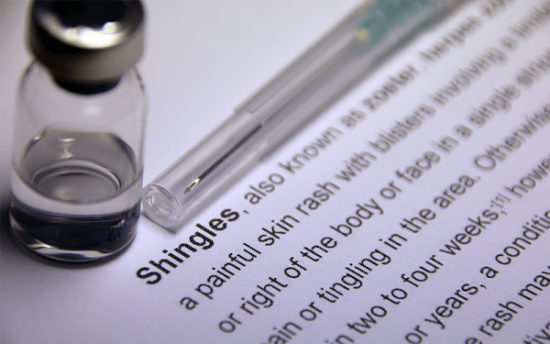I’m often asked by patients, “Should I get the shingles vaccine?” The answer to that question is “yes” for many people, but an explanation is in order.
What causes shingles and who is at risk?
Shingles is caused by the same virus that causes chickenpox – it’s called varicella zoster (VZV). Simply put, shingles is a localized recurrence of VZV. Children started getting vaccinated against chickenpox in 1995. That means that most people currently ages 20 and older likely had the chickenpox when they were young (before vaccinations began), and as a result, are at risk for it recurring as shingles.
After an initial chickenpox infection, VZV is then able to lie dormant in the nervous system for years before reappearing as shingles…and it when it does, it’s often with a vengeance. A triggering event, such as an infection, injury, surgery, or stress, can cause VZV to reappear on the skin where it becomes visible as painful shingles blisters.
While shingles can occur in anyone that has been previously infected by chickenpox, it most often occurs in the elderly. Additionally, people who have become immunosuppressed – such as those with HIV infection, on systemic steroids, or with poorly controlled diabetes – are especially susceptible to developing shingles.
What are the side effects of shingles? Is it contagious?
In addition to painful blisters, shingles sometimes include fever, chills, and muscle pain that can make you feel quite ill. The blistery rash itself can occur anywhere on the body but is most often found on the back and abdomen.
Shingles typically begin as an area of burning or pain and within several days, clusters of small fluid-filled bumps appear. These then crust over and become scabs.
Throughout the time the bumps or scabs are present, the virus is transmissible to anyone who has not previously been infected by or vaccinated for chickenpox. The virus can be particularly dangerous to pregnant women, so care should be taken to avoid spreading it to others.
As the shingles rash goes away, typically so does the associated pain. Most people recover from shingles after 2 to 3 weeks, but it can take up to 6 weeks to fully recover. That said, shingles scars can remain in the affected areas after the rash is gone.
In some cases, however, the pain of shingles can persist even after the rash is gone. This is a shingles complication called postherpetic neuralgia. This is a condition that causes pain in the areas that previously had the rash. The risk of postherpetic neuralgia increases with age and most commonly occurs when shingles have affected the face. Although there is no cure for postherpetic neuralgia, there are treatments available to reduce the symptoms and most people find that their condition improves over time.
What treatment is available for shingles?
There is an oral antiviral medication that can decrease the symptoms and duration of the shingles infection. However, this medication must be started soon after symptom onset. It’s important to know that even with medication, you could still experience some discomfort.
How can shingles be prevented?
As you can tell, shingles can be quite troublesome, making for an uncomfortable few weeks and perhaps even longer. Fortunately, there is a shingles vaccine available to help prevent shingles and its complications. The vaccine serves as a booster to your immune system, reminding it of the virus and preparing it to rev up in defense against a recurrence of VZV.
At U.S. Dermatology Partners, we treat patients who have already developed rashes associated with shingles, however, we do not administer the preventative vaccine. Particularly if you are over 60 or immunocompromised, it is a good idea to ask your primary care doctor if the vaccine might be right for you.
Looking to Visit a Dermatologist
If you are concerned that you may be developing shingles, a trip to the dermatologist can help reduce the severity of the infection. We have multiple locations throughout the country, so fill out our simple online form to get in touch with us. One of our local team members will reach out to you shortly to answer your questions or schedule an appointment for you to visit us soon.
Find a location near me
or

